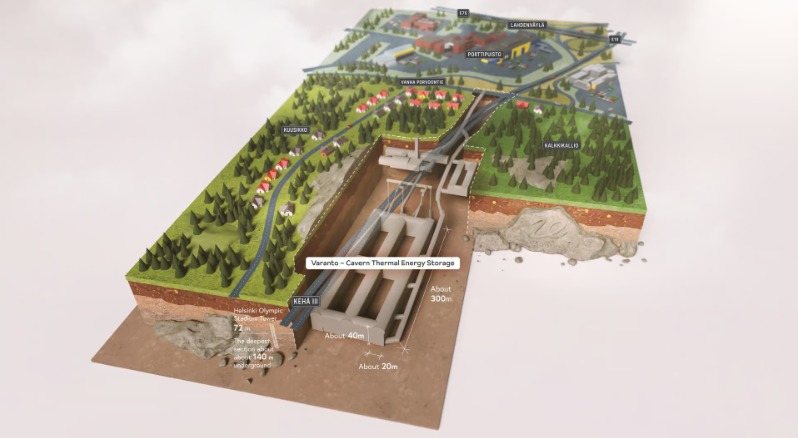World News15.04.2024
90-GWh thermal energy storage facility could heat a city for a year

QAZAQ GREEN. An energy supplier in Finland has announced the upcoming construction of an underground seasonal thermal energy storage facility about the size of two Madison Square Gardens that could meet the heating demands of a medium-sized city for up to a year, New Atlas reports.
Though renewable energy systems play an important part in the supply matrix, the wind doesn't always blow and long days of sunshine are not guaranteed. We've seen a number of energy storage solutions being proposed to deal with the intermittent nature of such setups over the years, including a hibernating battery, rechargeable aluminum, and an industrial-scale sand battery.
"The world is undergoing a huge energy transition," said Vantaan Energia's CEO, Jukka Toivonen. "Wind and solar power have become vital technologies in the transition from fossil fuels to clean energy. The biggest challenge of the energy transition so far has been the inability to store these intermittent forms of energy for later use. "Unfortunately, small-scale storage solutions, such as batteries or accumulators, are not sufficient; large, industrial-scale storage solutions are needed."
The company's solution for the city of Vantaa in the south of Finland is to construct huge underground caverns to store thermal energy, which can then be pumped to homes and business via an existing district heating network when needed.
The project has a total volume of 1.1 million cubic meters (38.85 million cubic feet), including processing facilities, and will be built into the city's bedrock at around 100 m (330 ft) below ground – though the deepest parts of the setup could go down as far as 140 m. Three caverns will be created, each measuring 300 m (984.25 ft) in length, 40 m (131.2 ft) in height and 20 m (65.6 ft) in width.
These will be filled with hot water by a pair of 60-MW electric boilers, powered by renewables when it's cheap to do so. Pressure within the space allows for temperatures to get as high as 140 °C (284 °F) without the water boiling over or steaming away. Waste heat from industry will also feed the setup, with a smart control system balancing energy sources.
The Varanto facility is reported to have a total thermal capacity of 90 GWh when "fully charged" – enough to meet the year-round domestic heating needs of a "medium-sized Finnish city."
The seasonal thermal energy storage facility underneath Vantaa in southern Finland is reported to have the equivalent energy capacity of 1.3 million electric car batteries
The majority of the homes in Finland's fourth most populated municipality are hooked up to the city's 600-km-plus (373-mile) underground district heating network, where hot water is pumped through a closed two-pipe system and into heat exchangers at each building. Once the heat transfer has taken place, the cooled water is then piped back to the production plant and reheated so the cycle can begin again.
The Nordic country is reported to be the largest producer of district heating in the region – in relation to population – and generated some 37.3 terawatt-hours in 2023, with more than half sourced from renewables and 14% coming from waste heat.
In Vantaa, a waste-to-energy plant that burns a mix of non-recyclable domestic and commercial/industrial waste, plus the wood-fueled Martinlaasko Power Plant, are responsible for providing the heat for the local network at the moment. A high-temperature incineration plant that can take in hazardous waste will come online next year.
The Varanto seasonal thermal energy storage facility is expected to enter the mix from 2028, with construction of the entrance due to start in a few months from now. Though reported to enable "cost-effective storage of renewable energy and waste heat on an industrial scale," actual figures or estimates are yet to be revealed.
Vantaan Energia estimates the build cost to come in at 200 million euros, with the Finnish Ministry of Economic Affairs and Employment already topping up the project pot with a grant of €19 million. The video below gives a brief overview.
Chinese company to build solar and wind power plants in Kyrgyzstan
Seaturns raises €2.45 million to industrialize wave energy technology and accelerate global rollout
Trump signs executive order to end subsidies for wind and solar energy
Uzbekistan's solar and wind power plants generate 5 Billion kWh since beginning of the year
Green Corridor Alliance JV registered in Baku to promote green energy development in Central Asia and the South Caucasus
In the EU renewable energy supply grew by 3.4% in 2024
IRENA accepting renewable energy project proposals in Central Asia until August 15
Astana to host Electronica Expo Kazakhstan Electronics Exhibition
WB gives rundown of Azerbaijan's green energy grid volume prospects
US solar sets new records as renewables nearly match natural gas – EIA
‘Wings’ on poles: Bill Gates-backed breakthrough wind turbine facility breaks ground
Perovskite tandem solar cell achieves new efficiency record
Kazakhstan and China endorse draft SCO joint statement on sustainable energy development
Innovative research on organic solar cells for space applications
Kazakhstan and Uzbekistan drive green energy progress in Central Asia
KazMunayGas launches pilot green hydrogen project in Atyrau
How private homeowners in Kazakhstan can make money from solar panels
14 countries are investing in Kazakhstan's renewable energy sector through auctions
How green hydrogen could transform Kazakhstan’s energy sector
IKEA offers ready-to-use solar power systems for balconies











